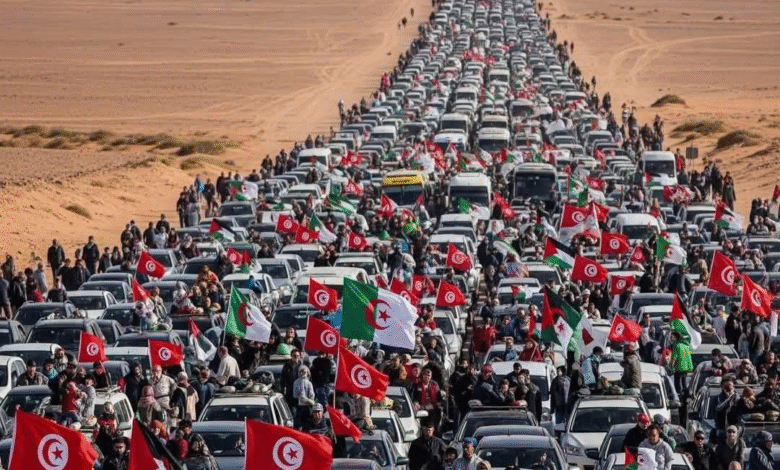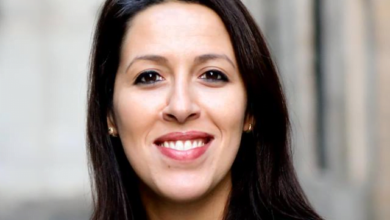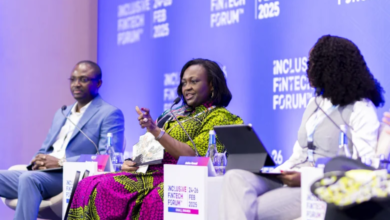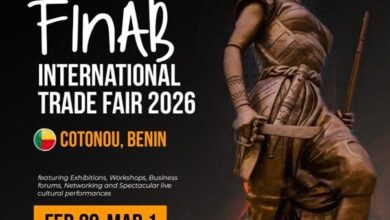When the people say no…
They set out by the dozens from Tunis, joined by hundreds from Morocco, Algeria, Libya... Thus could begin a modern epic — the tale of ordinary heroes who, refusing to bend in the face of injustice, marched forward with hearts full of solidarity and the indomitable flame of resistance.

“Soumoud”, in Arabic, means “resistance.” It is the name given to the caravan that, with strength and courage, dared to defy the blockade and bring food and hope to the starving people of Gaza.
Among them: grassroots activists, artists, above all — citizens. Tunisians at the start, joined by Moroccans, Algerians, Libyans. Proof, if proof were needed, that Maghreb unity is no myth — and though abandoned by governments, it lives on through the will of the people.
Crossing thousands of kilometers across North Africa and the Middle East with a message of peace, justice, and respect for human rights, the Soumoud Caravan — in a region where war, geopolitical tensions, and hardship fuel despair — reminds us that peaceful resistance is also a weapon.
A powerful, collective force that gives courage and hope.
The courage of the people is a response to the cowardice of the powerful
Unsurprisingly, the caravan did not reach its destination. Nor did the Freedom Flotilla, aboard the sailing boat Madleen, carrying 12 determined activists — Greta Thunberg (Sweden), Rima Hassan (France/Palestine), Thiago Ávila (Brazil), Yasemin Acar (Germany), Liam Cunningham (Ireland), Baptiste André, Omar Faiad, Pascal Maurieras, Yanis Mhamdi, Suayb Ordu, Sergio Toribio, and Marco van Rennes — all aiming to symbolically break the Gaza blockade.
They too were intercepted, manhandled, detained — in open violation of international conventions. And yet, far from being a failure, the caravan of resistance and the Freedom Flotilla are more than symbols —They are a call to collective responsibility.
Each boat is a floating manifesto, a voice raised against indifference and the normalization of oppression. They reveal just how much individual and collective courage can ripple across the global stage.
When States remain silent, the voice of the people takes to the sea
Even more so, they are a reminder to the world’s powers: in the face of indifference, complicity, and contempt, the people say no.
Just as the dock workers of the port of Marseille-Fos did, when they refused to load military components bound for Israel.
A strong gesture, spontaneous, and above all, deeply human — a rare act of visible solidarity. In the face of war, violence, and dehumanization, these workers chose to say no, refusing to become indirect accomplices to what they viewed as an injustice.
This symbolic refusal goes beyond mere protest: it is a moral stand, a clear position taken in the face of conflict in the Middle East. It reminds us that, in our interconnected societies, every link has a role and a responsibility.
Three lessons in resistance
These three initiatives are bound by the same essence:
the power of solidarity and the dignity of peaceful resistance.
They teach us that in the face of violence, complicit silence, or resignation, action is possible.
That peoples, even when divided by borders, can unite in their demand for justice.
First lesson:
Resistance is not only armed — it is also spiritual, social, and moral. The Soumoud Caravan is a living embodiment of this, in a region where protest also takes the form of collective gestures of solidarity.
Second lesson:
Visibility is essential. The Freedom Flotilla proves that publicly denouncing injustice is vital to shifting diplomatic and media lines.
Third lesson:
Individual and collective conscience can make a difference, even in a world dominated by political and economic powers. The refusal of the Marseille-Fos dockers is a powerful reminder that each citizen, through their choices, helps build a more just world.
A hope to nurture
As conflicts persist and diplomacy often seems powerless, these initiatives remind us of the value of citizen mobilization and concrete engagement.
They show that peace is not only declared in the palaces of the powerful — it is built in the streets, in ports, along the roads.
“We love life — if we can find a way to save it,” wrote the poet Mahmoud Darwish.
Marches, boycotts, caravans — these seemingly modest acts are in fact brave attempts to save life, dignity, and justice.
They call on us to never stop believing in the strength of a united people.






